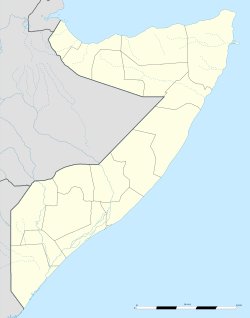Buurhakaba
| Buurhakaba Buurhakaba | ||
|---|---|---|
| Koordinaten | 2° 47′ N, 44° 5′ O | |
| Basisdaten | ||
| Staat | Somalia | |
| Bay | ||
| ISO 3166-2 | SO-BY | |
| Einwohner | 28.000 | |
Buurhakaba (auch Bur Hakkaba, Buur-Hakba oder Bur Acaba geschrieben) ist eine Stadt in der Region Bay im Süden Somalias. Sie hat etwa 28.000 Einwohner[1] und liegt südöstlich von Baidoa, dem Sitz der somalischen Übergangsregierung. Buurhakaba liegt an einer Straße von Baidoa nach Afgooye.
Der Ort war 2006 zwischen der Übergangsregierung und der Union islamischer Gerichte, von der er zeitweise eingenommen wurde, stark umkämpft. Unterdessen ist er unter Kontrolle der Übergangsregierung und des Nachbarlandes Äthiopien.
Weblinks
Einzelnachweise
Auf dieser Seite verwendete Medien
Autor/Urheber: AMISOM Public Information, Lizenz: CC0
Somali civilians are seen in the central Somali town of Buur-Hakba following it's capture by the Somali National Army (SNA) and Ugandan forces serving with the African Union Mission in Somalia (AMISOM). The SNA, supported by AMISOM forces captured the strategically important town 27 February 2013, on the Afgooye-Baidoa corridor in Bay region from Al-Qaeda-affiliated extremist group Al Shabaab without any resistance, marking a significant loss for the group. The town, located 64kms east of Baidoa, was a stronghold of the Shabaab where they extorted high levies of illegal taxation on the local civilian populations and used it as a base from where they planned and launched attacks against government forces and installations, AMISOM and the Somali population. Buur-Hakba is the latest in a string of significant territorial losses for the extremist group to SNA and AMISOM forces over the last 18 months, which has seen their area of influence and control over towns and areas across Somalia steadily decrease. AU-UN IST PHOTO / STUART PRICE.
Autor/Urheber: Eric Gaba (Sting - fr:Sting), Lizenz: CC BY-SA 3.0
Blank administrative map of Somalia, for geo-location purposes.



